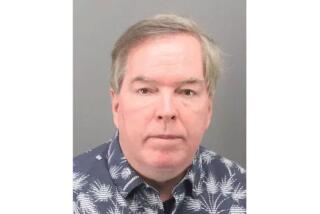Man Gets 13 Months for Role in Tax Evasion Plot
- Share via
A Seal Beach man has been sentenced to 13 months in prison and three years’ probation for his role in setting up a mail-order church that served as a tax evasion scheme for more than 3,000 people.
Dennis D. Riness, 42, was also fined $5,000 and ordered to perform 1,000 hours of community service by U.S. District Judge Consuelo B. Marshall for his participation in the Church of Universal Harmony, which operated in Tustin from 1978 until 1984.
Riness, who pleaded guilty to one count of conspiracy to defraud the government and one count of aiding and assisting in the preparation of false income tax returns, faced a maximum eight-year prison term.
Riness’ partner, Michael S. McGinnis, was named in the original indictment earlier this year along with three other men: Stanley Wayne Cruson, Winston Scott Mesch and James A. Hoffman, all of whom sold “congregation charters” to the church.
Living in France
McGinnis, a former Tustin resident, is living in France, and Cruson is believed to be living in Costa Rica, Assistant U.S. Atty. Jeffrey Modisett said. Charges against Mesch and Hoffman, both of San Jose, have been dropped here, but an investigation is continuing in that city, Modisett said.
According to federal prosecutors, Riness’ and McGinnis’ scheme began when they formed “TEA, an Assn. of 20th-Century Patriots” in 1978 as a tax-protest organization. Next, they obtained a charter from the Universal Life Church Inc. in Modesto, and named their church the Church of Universal Harmony.
Through TEA and their newly formed church, Riness and McGinnis operated a sales organization that sold supposedly tax-exempt congregation charters from the Universal Life Church to the public for $1,250 to $1,500, prosecutors said.
3,000 Charters
The organization sold more than 3,000 charters in California, Oregon, Nevada and Arizona in its six years of operation, grossing more than $6 million, authorities said.
Buyers were instructed to set up bank accounts in the name of Universal Life Church and then deposit their own “contributions.” The contributions then would be deducted on personal income tax returns as church donations, but the donor would be free to use money.
At the end of the year, the Church of Universal Harmony would arrange for each charter member to receive a “contribution receipt” in the name of Universal Life Church Inc., Modesto, for tax purposes.
The government is not prosecuting the charter buyers, but the Internal Revenue Service is trying to collect taxes owed on the phony contributions, plus interest, Modisett said.
More to Read
Sign up for Essential California
The most important California stories and recommendations in your inbox every morning.
You may occasionally receive promotional content from the Los Angeles Times.













